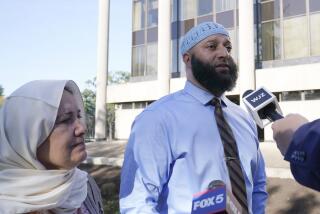Judge Reverses Fingerprint Decision
- Share via
A federal judge who stunned the legal community earlier this year by forbidding the use of a fingerprint expert’s opinion in a Philadelphia murder trial reversed his decision Wednesday.
Noting that a three-day hearing two weeks ago provided new information, U.S. District Judge Louis Pollak said, “I have changed my mind.”
The 59-page ruling is a major setback for lawyers across the country who have been raising a series of legal challenges to fingerprint evidence.
The challenges began emerging because of U.S. Supreme Court rulings in recent years that have imposed more rigorous standards for the admission of scientific and expert testimony.
Until Pollak’s initial ruling Jan. 7 in their favor, challengers had suffered one defeat after another.
Opponents of fingerprint evidence considered the ruling a turning point that would become the basis for successful challenges in other courtrooms.
“It definitely throws a wet blanket on their hopes,” said David Faigman, a professor at the Hastings School of Law in San Francisco.
U.S. Atty. Patrick Meehan, whose office is prosecuting a murder trial in which fingerprints are key evidence, called the decision a major victory.
“It is certainly an important conclusion for law enforcement,” he said.
In his earlier ruling, Pollak said fingerprint comparison techniques have not been adequately validated through research, that they don’t incorporate a means of determining how often examiners err and that they don’t use objective standards for determining whether two prints match.
As a result, Pollak said in January, an expert would be allowed to identify matching details of prints but could not specifically say that a defendant’s print matched those found at the scene.
In his ruling Wednesday, Pollak reversed one of his major findings: that the subjectivity of fingerprint comparisons meant that the techniques for matching crime scene prints with known prints was not governed by any describable set of standards.
“On further reflection, I disagree with myself,” wrote Pollak, a former dean of Yale Law School.
While continuing to maintain that fingerprint examiners’ opinions are subjective, Pollak concluded Wednesday that they are no more subjective than many other forensic science opinions accepted by courts. Moreover, he said fingerprint techniques allow for less subjectivity than many other fields of expertise.
Pollak held to his earlier opinion that the reliability of fingerprint methods has not been subjected to scientific testing and said such tests “would clearly aid in measuring [the techniques’] reliability.”
But he said defense lawyers in the case have not shown that the FBI, which did the fingerprint analysis, has a high error rate.
“With those findings in mind, I am not persuaded that the courts should defer admission of testimony on fingerprinting . . . until academic investigators . . . have made substantial headway on a verification and validation research agenda.”
Although Pollak accepted the reliability of the FBI’s examiners in this case, he clearly was unimpressed with the proficiency tests it gives to its examiners to check their error rates.
He accepted the defense arguments that the tests were too simple and did not adequately test real fingerprint comparisons.
“On the record before me, the FBI examiners got very high proficiency grades, but the tests they took did not,” he said.
Pollak also held firm to his January opinion that fingerprinting is not a science, a claim that experts in the field continue to maintain. But he said the Supreme Court rulings do not require that expert testimony be scientific testimony.
Robert Epstein, a federal public defender in Philadelphia who has been a leader in the challenges, said he was disappointed. But he said Pollak’s ruling still recognizes that fingerprint technology fails to meet some important reliability standards, such as the lack of testing.
Epstein said Pollak was wrong to accept the FBI’s expertise simply because the defense didn’t show that the agency had never made mistakes when matching fingerprints.
“The burden of proof is on the prosecution to show the reliability of their expert testimony,” Epstein said. “Ultimately, the court of appeals is going to resolve this issue, either in this case or some other case.”
The rulings mean that the murder trial in which it came will resume Monday. The three defendants are charged with operating a drug ring and are linked to four killings. A jury was picked earlier this year.
More to Read
Sign up for Essential California
The most important California stories and recommendations in your inbox every morning.
You may occasionally receive promotional content from the Los Angeles Times.










